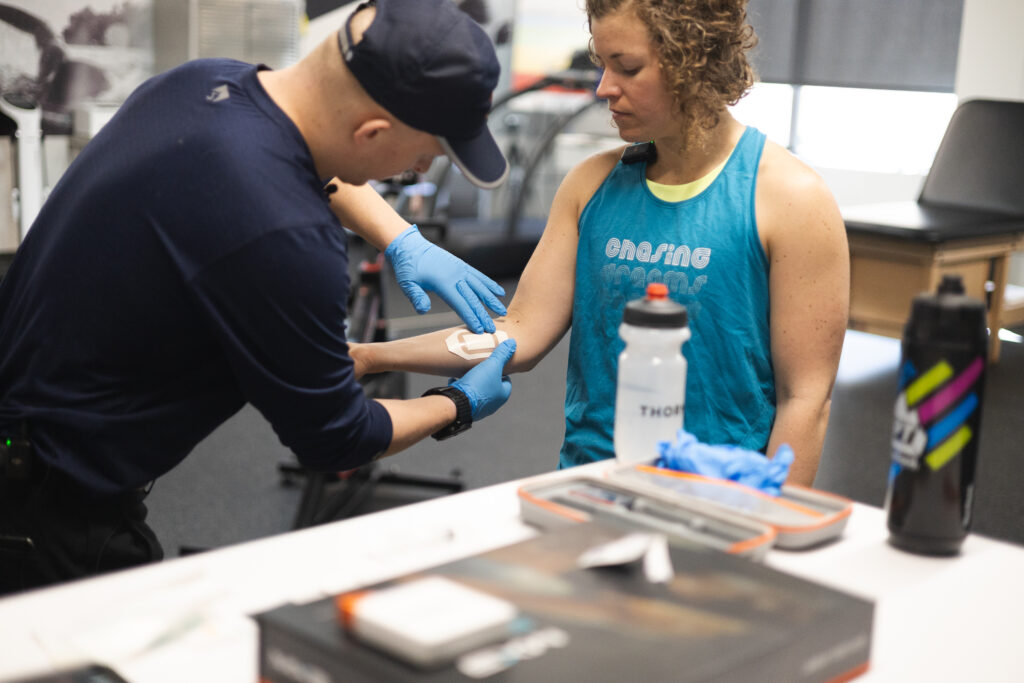We all know that hydration is important, but what does that actually mean? You’ve probably been told about the value of drinking water by your coaches, doctors and everyone in between. However, proper hydration is not a one-size-fits-all solution. What improves one person’s health and performance may add strain to another. To properly hydrate yourself, you need a deep understanding of your body’s needs and an individualized game plan based on your situation. Read this blog for our best tips on hydration and learn how it impacts your athletic performance and overall health.
Before we dive into the specifics of hydration, let’s look at a few facts about water and the body:
Since most of our body is water, it is easy to understand why proper hydration directly impacts how we feel and perform. Now that you know the importance of hydrating, let’s look at where to begin.
Although consuming more water is a great habit, simply drinking a larger volume of water may not be enough. Now that you understand the importance of hydration, let’s get started. First, how much water do you lose when you exercise? Think about this in terms of the volume of water you’re drinking. Since you are losing water through sweat during exercise, you must replace those fluids for your body to continue functioning optimally.

How do you know how much water you’re losing? The easiest way to find out is by weighing yourself before and after training. By taking your weight before and after exercise, you’ll quickly understand how much water you are sweating during your training. You should switch up your environment to understand how different temperatures impact your water loss. Also, vary your workout types to understand sweat loss by activity. For instance, cycling indoors on a trainer may not lead to the same sweat levels as going for a run outside on a warmer day.
Now that you understand the volume of water you’re losing, you need to consider sodium loss. On average, individuals lose approximately 950 mg/L of sodium per liter (33 oz) of sweat. However, everyone has a different amount of sodium loss. Some people lose as much as 2,000 mg/L, and others as little as 200 mg/L. This means that one person could be losing 10 times the amount of sodium as someone else during the same duration and intensity of a workout.

Understanding your sodium loss rates allows you to supplement electrolytes with your fluids. Electrolytes replenish the sodium you’re losing through sweat and allow your body to return to optimal performance. The volume of electrolytes and water you need to consume will depend on your unique sweat rate. Knowing how much water and sodium you’re losing is key to maintaining health and performance long-term. If you’d like to uncover your personal sweat rate, click here to book your sweat test appointment.

Hydration is a blend of applicable knowledge and personal goals. To determine your hydration strategy, start by considering a few of the questions below:
Using answers to the questions above, you can develop a hydration game plan. Your plan will consist of information based on your body and will take into account the day’s conditions. For example, an hour-long workout may require only one mixed bottle of water and sodium to maintain proper hydration levels. On the other hand, running a marathon will require multiple fueling touch points and a more detailed plan regarding the temperature and fueling stations available.
It turns out that the age-old advice of “drink more water” is incomplete. While avoiding dehydration is important, there are nuances to making decisions related to peak hydration. Now, we hope that you not only understand how critical proper hydration is for overall health and performance but also have a starting point for what to measure. By thoroughly understanding your sweat and sodium levels, you can take charge of your hydration to maximize long-term health and wellness. So, drink up, stay properly hydrated, and remember: in the journey of health, you are the driver. True Health is Self-Made.
Human Powered Health is staffed with Master's and PhD-level performance physiologists who are dedicated to helping you improve your health and performance. Our product is a healthier you, and we have the science to make you better than ever.
Human Powered Health uses high-precision, research-grade technology for all assessments in order to provide a superior level of service and quality for anyone who wants to learn more about their health and performance metrics.
We are on a mission to power health and athletic performance for motivated humans. Your body belongs to you. You deserve accurate information about it. We give everyone the data and expertise to fine-tune their own health and athletic performance. Because knowledge is power, and true health is self-made.